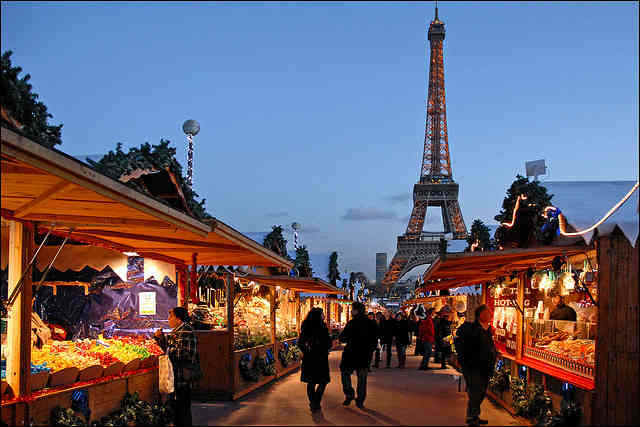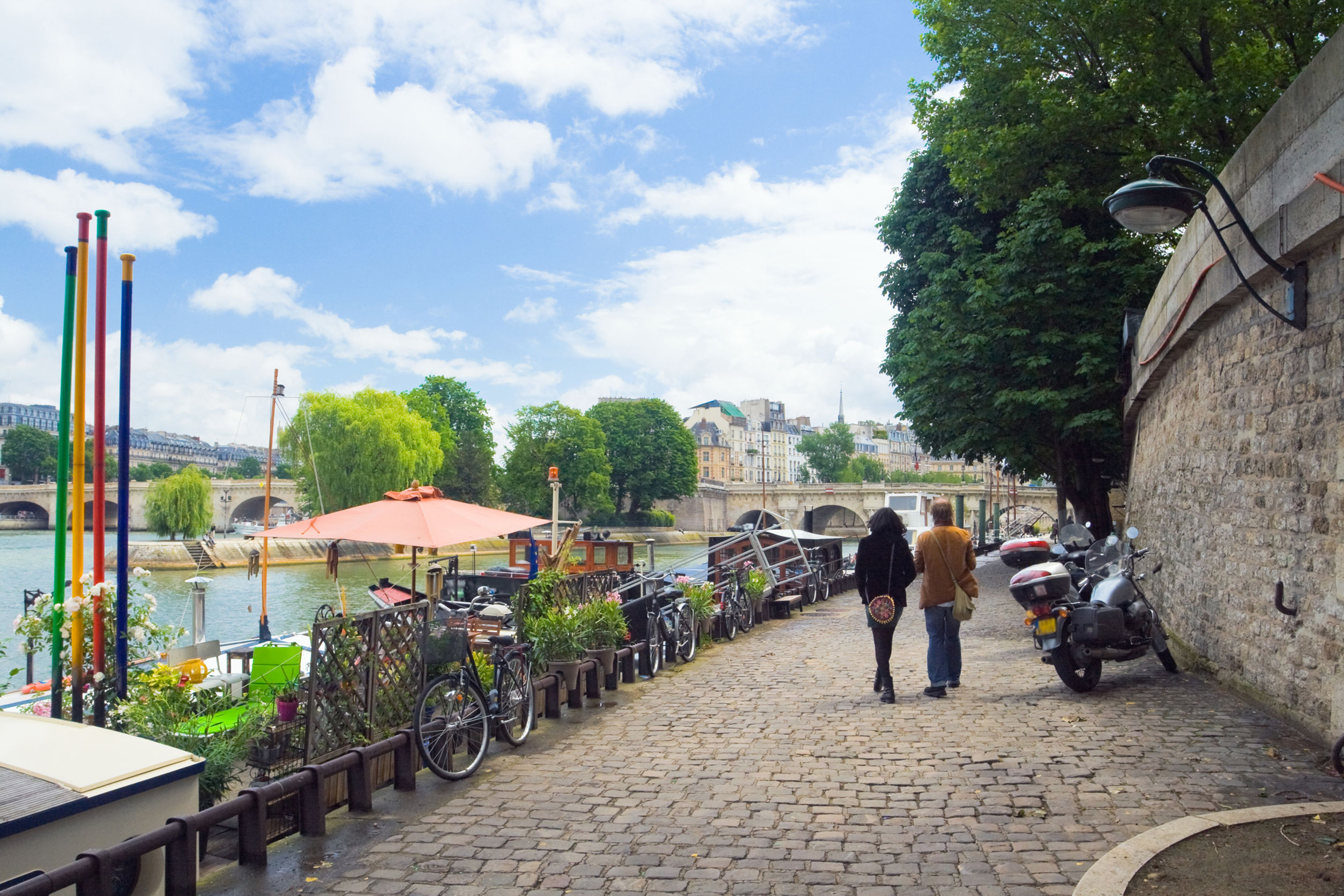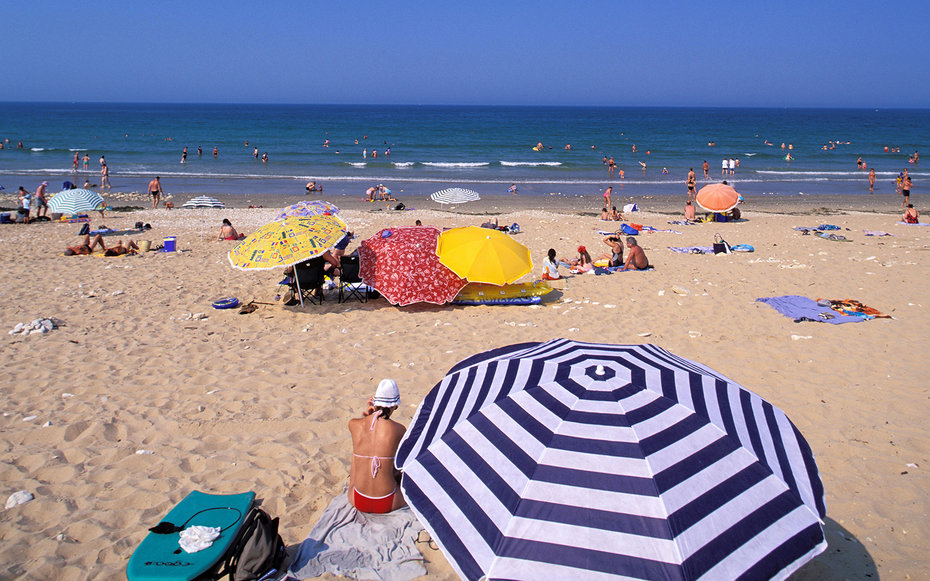
Traveling to France? Here’s How to Learn as Much French as Possible While You’re There
Do you know what it feels like to learn a language with all your senses?
You’ll know what I mean as soon as you set foot in France.
Learning French in France is one of the quickest—and most exciting—ways to get a full immersion experience, where everything you see and hear (and even smell, taste and touch!) gets you thinking and communicating in French.
In this post, we’ll show you where to go, what local schools can help you study and even what seasons are particularly fruitful for French learning.
Contents
Download: This blog post is available as a convenient and portable PDF that you can take anywhere. Click here to get a copy. (Download)
Why Learn French in France?
In case you aren’t already completely convinced of the value of traveling to France, here’s what the experience abroad has to offer your language skills. Be careful, though—these benefits only come to travelers with their ears and eyes totally open to the language around them.
First, being surrounded by French will get you fluent faster. When you’re learning any new skill, surrounding yourself—fully immersing yourself—in activities relevant to that particular skill will accelerate your rate of learning. Traveling to France in order to learn French is making a conscious choice to dive into the French language and culture.
You’ll utilize context clues to make sense of what’s going on around you, you’ll be required to communicate only in French and even when you’re not actively listening or speaking your subconscious will be soaking up the language.
Of course, immersion isn’t only about being physically present in France. It’s also about immersing yourself in the French digital space, which can easily be accomplished through social media and a modern language learning program.
For example, FluentU is a language learning program that centers around authentic French content. If there’s a word or phrase in a music video or news segment that you don’t understand, the bilingual interactive subtitles are there to provide definitions, example sentences and more contextual information to help you out.
Second, you’ll have an opportunity to learn local vernacular and vocabulary specific to French culture. I’m talking about the education you don’t get from a textbook. Taking the time to learn French in France will expose you to local idiosyncrasies and quirks about French language and culture. You may hear some new, trendy words or finally understand that ça m’est égal (I don’t care) isn’t a commonly used phrase in the south of France despite your French teacher drilling it into your memory.
Finally, for a unique introduction to French culture and native French before you jet off, check out the video below! The video covers everything from French texting slang to social norms and interactions.
The Traveler’s Guide to Learning French in France
1. Public Places Conducive to Learning French in France
At le marché (the market) or le supermarché (the grocery store)
Not only are French markets a fabulous place to hear a lot of French, but they’re also a (tasty) place to practice basic language skills such as food vocabulary, numbers/currency and greetings/goodbyes.
Whether you enter a grocery store or wander into an open-air market, frequenting these places will porter les fruits (pay off/produce results) for your French food vocabulary.
At the café or la boulangerie (bakery)
Another delectable place to practice les politesses (manners), the local bakery is generally labeled with the names of local treats. A café menu offers a great opportunity to practice reading and pronouncing more foundational vocabulary as well as applying your knowledge and comprehension in context.
At la bibliothèque (the library)
The public library in any city is free and open to the public, and it’s a fabulous place to read in French on any topic.
Most libraries will have a children’s section as well, and almost without fail a B-D section for comic books, known in French as bandes dessinées. Libraries are always well-labeled and offer diverse language learning opportunities. Be sure to check out what events or talks the library is hosting—these are great for practicing your listening comprehension skills in a structured environment.
On le transport public (public transport)
Airplane, train, tram, metro, bus, taxi, bike… navigating France requires you to use some French if you want to get to the boulangerie for a croissant aux amandes (almond crescent roll)… err, to practice your French.
Usually, this is the most likely place where you may be able to get away with English, but public transport offers a great opportunity to learn vocabulary related to directions, time, location and general travel terms.
At le musée (the museum)
A fair number of museums are either free for students (upon presentation of valid ID) or discounted for children and youths 26 and under.
You can usually find exhibit guides in both English and French, so you’ll have in-context translations right in front of you when needed. The museum is of course another wonderful place to gain cultural and historical knowledge, and to practice reading formal/academic-style French.
At le cinéma (the movie theater)
Since the French enjoy American films in addition to their quirky French films, it’s not terribly difficult to find films in English with French subtitles at the movie theater. This provides a great opportunity for beginners to get familiar with French vocabulary, sentence structures and conversation without becoming overwhelmed. Rarely can you find the opposite (French with English subtitles).
If you want a full-French movie experience, animated movies in French typically use a simplified vocabulary providing a nice access point for French learners. Using context clues as you watch any French movie will support your listening comprehension.
While lèche-vitrine (window shopping)
The French phase above literally means “window-licking,” and faire les vitrines is to go window shopping.
The French love to flâner (stroll/wander) the streets peering into shop windows for good deals. Not only does window-shopping offer a peek at current French fashion, but it can also add dimension to the French you hear around you.
For example, there’s a slight difference between une écharpe and un foulard—two words for the famous French scarf.
2. Places to Learn French Through Formal Language Courses
Coeur de France Ecole de Langues — Sancerre, in the Loire Valley
This language school is situated in beautiful wine country in the Loire Valley. While there are many programs available, this is an especially good option if you’re visiting France with loved ones. There are packages for families, couples and kids, as well as courses for individuals or groups and one-on-one focused teaching.
They offer classes year round along with a number of options for local accommodations.
Centre Internationale d’Antibes — Antibes, on the French Riviera
The International Center in Antibes has 30 years of experience teaching French as a foreign language, offering courses for kids, families and groups (student or other).
They offer a choice of local accommodation or host families, and run programs mainly in the divine months of summer on the French Riviera.
Accent Français — Montpellier, in the south of France
This French language school is geared mainly toward younger students of various levels or students seeking exam preparation and support. All teachers are degree-holding French natives.
Programs run year-round and also include cultural courses and activities in sunny Montpellier.
France Langue — City of your choice
This school offers language and cultural immersion in four different French cities as well as the francophone island of Martinique. They offer programs such as professional French, academic French and even have an Au Pair and family program.
Feeling really adventurous? Try their French and sport programs, where you can learn the language while scuba diving, surfing, golfing and more.
FluentU takes authentic videos—like music videos, movie trailers, news and inspiring talks—and turns them into personalized language learning lessons.
You can try FluentU for free for 2 weeks. Check out the website or download the iOS app or Android app.
P.S. Click here to take advantage of our current sale! (Expires at the end of this month.)
3. The Best Times to Learn French in France
During les fêtes (holidays) and les célébrations (celebrations)
The French take their holidays and jours congés (days off) very seriously. You’ll get an incredible cultural and language-learning experience surrounding major celebrations such as:
- La Fête nationale française (French National Day/Bastille Day) — July 14
- Noël (Christmas) — December 25
- Pâques (Easter) —Mid-April
- Mardi Gras (Shrove Tuesday) — February 28
- La Fête du Muguet/La Fête du Travail (May Day/Labor Day) — May 1
During these holidays, you’ll hear many celebratory phrases and enjoy a slew of festive treats. Don’t forget the semi-annual French sales, either, which is practically its own holiday season in France.
On le weekend (the weekend)
Weekend activities in France are fairly predictable and there’s a certain “free-time” vocabulary pertinent to the weekend.
You’ll likely faire la grasse matinée (literally “have a fat morning” or sleep in!). Maybe you’ll faire une promenade/du sport/du shopping (go for a walk, play sports, go shopping) or aller au marché/à la plage/au resto (go to the market/to the beach/restaurant).
During the weekend, people are out and about with a little more time to bavarder (to chat).
During l’été (the summer)
Likewise, summer is tourist season, especially in those dreamy southern coastal French cities. Most language programs run during the summer, and there are generally more public events or celebrations, and therefore more learning opportunities.
Ultimately, no matter where you choose to go to learn French in France, you’ll do just that—learn French! There’s no better way to learn a language than to completely and fully plunge in.
Download: This blog post is available as a convenient and portable PDF that you can take anywhere. Click here to get a copy. (Download)
And one more thing...
If you like learning French on your own time and from the comfort of your smart device, then I'd be remiss to not tell you about FluentU.
FluentU has a wide variety of great content, like interviews, documentary excerpts and web series, as you can see here:

FluentU brings native French videos with reach. With interactive captions, you can tap on any word to see an image, definition and useful examples.

For example, if you tap on the word "crois," you'll see this:

Practice and reinforce all the vocabulary you've learned in a given video with learn mode. Swipe left or right to see more examples for the word you’re learning, and play the mini-games found in our dynamic flashcards, like "fill in the blank."

All throughout, FluentU tracks the vocabulary that you’re learning and uses this information to give you a totally personalized experience. It gives you extra practice with difficult words—and reminds you when it’s time to review what you’ve learned.
Start using the FluentU website on your computer or tablet or, better yet, download the FluentU app from the iTunes or Google Play store. Click here to take advantage of our current sale! (Expires at the end of this month.)













